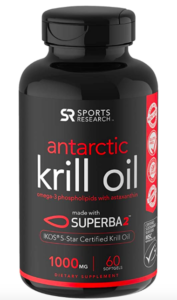Does Fish Oil Cause Afib?
I’m a big fan of supplementing with omega-3s—essential fats play critical roles in neurodevelopment, cognitive function, immune response, inflammation control, cardiovascular health, cancer prevention, healthy aging, and even lung health.
Fish oil is an incredible source of omega-3s. There’s an overwhelming amount of evidence supporting the benefits of omega-3 fatty acids. But occasionally a study fails to find any benefit. And once in a while, a study gets published raising a false alarm that fish oil might be harmful to some aspect of our health.
That’s what happened a few months ago, when a large observational study suggested that regular use of fish oil may worsen the progression of cardiovascular diseases in some people. As soon as this study was published, the media jumped all over it with headlines warning of the dangers of fish oil.
 We have hundreds of studies pointing to the health benefits of fish oil. In light of that, how do we interpret a new study that seemingly tells us fish oil could be bad for us? Let’s look deeper into this study to understand what the researchers saw.
We have hundreds of studies pointing to the health benefits of fish oil. In light of that, how do we interpret a new study that seemingly tells us fish oil could be bad for us? Let’s look deeper into this study to understand what the researchers saw.
The study used data from the UK Biobank, a cohort of nearly half a million people from the United Kingdom aged 40 to 65. None of the participants had cardiovascular disease at baseline. On a single occasion, the participants completed a survey in which they indicated whether they were regular users of fish oil supplements by answering “yes” or “no.” This means the study didn’t factor any information on duration of use, type of supplement used, formulation, or dosage.
The participants were monitored for a follow up period of about 12 years, during which diagnosis of atrial fibrillation (Afib), major adverse cardiovascular events (i.e., heart attack, stroke, or heart failure), and death were recorded. The study indicated that using fish oil supplements was associated with a 13% greater risk of developing Afib.
On the other hand, fish oil use wasn’t associated with a greater risk of transitioning from health to a major adverse cardiovascular event, or even from health to death.
Among the participants who developed Afib, using fish oil was associated with an 8% lower risk for transitioning to a major adverse cardiovascular event and a 9% lower risk of death.
The results of this study imply that as a primary prevention strategy for cardiovascular disease, fish oil supplementation may not be useful, and may in fact be harmful. But as a secondary prevention strategy among people who may have developed early-stage or late-stage cardiovascular disease, fish oil may provide protection.
Should You Stop Using Fish Oil?
Before jumping to that conclusion, let’s look a little deeper at the numbers. The healthy fish oil users had a 13% higher risk of Afib and a 5% higher risk of stroke compared to non-users. On the surface, that could understandably raise some eyebrows. But these numbers look at relative risk, which is a ratio of difference in risk between healthy users and non-users. Absolute risk is a better number to consider. It tells us the actual probability of an outcome occurring in a specific group regardless of any other factors.
In the study, the actual incidence of Afib in non-fish oil users was 4.2%, while in the fish oil users it was 4.8%. That represents an absolute risk increase of 0.6%. For me, that’s not enough to worry about. And you need to interpret that in light of the fact that fish oil protected the subjects from transitioning to more severe cardiovascular disease.
Preventing stroke, heart failure, myocardial infarction, and death are more important outcomes than Afib. What’s interesting about this study is the media headlines and the authors of the study choose to focus on the small risk of using fish oil instead of the four beneficial results that were observed. Personally, I’ll take that increased protection against more severe disease over the relatively low increased risk of Afib.
There is an overwhelming amount of evidence supporting the use of omega-3 supplements to promote heart health and prevent cardiovascular disease. One important study was published in 2020 that looked at the exact same group of participants as the current UK Biobank study. These subjects also self-reported fish oil use. The results of the study were almost the opposite. Regular use of fish oil was associated with a 13% lower risk of all-cause mortality, a 16% lower risk of dying from cardiovascular disease, and a 7% lower risk of stroke or heart attack.
An even more impressive study looked at levels of omega-3s (DHA) in the blood and found that higher blood levels of omega-3s were associated with lower risk for all-cause mortality and lower risk of dying from cardiovascular disease.
Also, a meta-analysis of 17 control trial studies found that omega-3 supplementation of 2-4 grams per day protects against all-cause mortality, cardiovascular disease mortality, and stroke.
The important thing to understand: other than a slightly elevated risk of Afib, no other studies have found detrimental effects of fish oil supplementation. The media likes to sensationalize bad news. And when bad news goes against the grain of an overwhelming amount of good news, you might want to question it.
Omega-3 Supplementation
Although omega-3s are present in many foods, especially nuts, seaweed, and fatty fish (like salmon, tuna, and mackerel), some people may require supplemental omega-3s to ensure they’re getting enough. There is an overwhelming amount of evidence that shows omega-3 supplementation can positively impact human health and even counteract age-related and chronic inflammatory processes and conditions, including cardiovascular disease, lung disease, dementia, and autoimmunity.
How much should you take?
The general recommendations made by most health organizations indicate that supplementing with 1-2 grams of fish oil per day is safe. Some studies I’ve seen will supplement with up to 4 grams per day. I would stick with 1-2. Ultimately, if you’re going to supplement with something like fish oil, you should check with your doctor first.
And remember, when the media reports something that doesn’t sound quite right, check the source and have a quick look at some of the other evidence. There might be more to the story than what the media would lead you to believe.
Stay Strong,
Bo Railey


